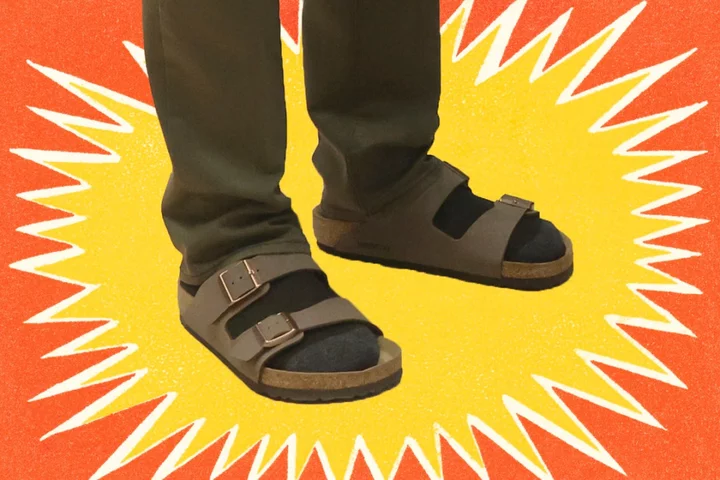
Ed Gamble used to weigh himself every day amid ‘obsessive’ weight loss: ‘I didn’t have a social life’
Comedian Ed Gamble has opened up about battling his “obsessive” tendencies and the “evil” bathroom scales while discussing losing weight. The stand-up comic and panel show regular lost seven stone in weight in his early twenties, and is now releasing a memoir about his relationship with food titled Glutton: The Multi-Course Life of a Very Greedy Boy. In a new interview with The Times, the comic – who hosts comedy food podcast Off Menu with fellow comedian James Acaster – opened up about the ways losing weight changed his life. “After losing weight, I got more obsessed with my image. You do feel different, wondering, ‘Oh, maybe I’m attractive now.’” Gamble, 37, said that he had developed a fixation on fitness after losing weight, and currently took part in the “cult” of CrossFit. However, the Great British Menu judge – who has Type 1 diabetes – had to watch his more obsessive tendencies when he first began to lose weight after he dropped to 12 stone. At this point, Gamble was weighing himself every day. “That’s not a weight I operate well at,” he recalled. “It means I don’t have a social life; I’m always exercising and thinking about what I eat. “At that point, my mum said, ‘You don’t need to keep doing this. Build in having fun again.’” Gamble said that while had weighing scales in his bathroom at the time, he saw them as “evil”. “You’ve put on 2lb. So what? Stop looking. Go with how you feel,” he said. Growing up as a “posh little boy”, Gamble often used food to prove that he was “like the grown-ups”. Speaking to The Independent in August, Ed Gamble recalled first eating poached salmon when he was three or four years old. “I think it would be easy to serve child me in a restaurant,” he said. “I think you’d think I was weird, possibly, because I’d be sat bold upright at the table, sort of like a mini [food critic] Jay Rayner, just demanding everything.” Glutton: The Multi-Course Life of a Very Greedy Boy is released on 26 October. For anyone struggling with the issues raised in this article, eating disorder charity Beat’s helpline is available 365 days a year on 0808 801 0677. NCFED offers information, resources and counselling for those suffering from eating disorders, as well as their support networks. Visit eating-disorders.org.uk or call 0845 838 2040 Read More Should plus-size travellers be asked to take weight-loss drugs for flights? It’s plane crazy Paloma Faith on her heartbreak and being a single mum: ‘Our relationship ended because we had those children – it was worth it’ Weight-loss jabs linked to ‘severe’ stomach problems – study Some people are born with a ‘talent for happiness’ – so what’s their secret? Presenter Louise Minchin: Menopause conversations are no longer taboo – but we need to keep going Israel-Hamas conflict: How to talk to teenagers about distressing news stories
2023-10-14 19:26

Birkenstock or bust: How a deeply uncool shoe became a modern must-have
How do you define “cool”? Maybe it’s ostentation. Maybe it’s exclusivity. Maybe it’s a 250-year-old orthopaedically inspired German shoe. In 2023, odds are it’s the latter. This week, it was announced that Birkenstock had landed on the US stock market with a $7.5bn (£6.1bn) valuation, more than double its worth in 2021. If you’re unfamiliar with these absurdly comfortable sandals, the classic “Arizona” Birkenstock features a layered sole made of jute fibre and moulded cork, offering your foot some serious support, with two thick suede straps coming in some sort of earthy hue. The brand itself dates back to 1774, when founder Johann Adam Birkenstock started making shoes near Frankfurt. But for a long time, the shoes themselves were the pinnacle of dorkiness. There was nothing chic about the geek connotations, either. They were just, to put it bluntly, a bit lame – often associated with exceedingly earnest, granola-eating American liberals, and dubbed everything from “Geekenstocks” to “Flintstone feet”. You get the idea. Today, though, Birkenstock sells roughly 25 million pairs of shoes a year, and the brand is seen on and celebrated by stars such as Kendall Jenner, Gigi Hadid, Katie Holmes and Sienna Miller. Some have even been spotted wearing them with socks, demolishing decades of jokes about a look once considered fashion’s cardinal sin. It all adds up to form the greatest redemption arc in footwear. But how has one company managed to pull off a complete 180, as if transforming a pumpkin into Cinderella’s glass slipper? “The German engineering that has gone into this product actually speaks for itself,” says fashion analyst and author of Look at the Labels, Jennifer Walderdorff. “There are no gimmicks: the shoe does what it says on the tin. Its reliability is what [makes it] a fashion staple.” It has not been a quick turnaround, though, its reappraisal starting – sort of – in the 1990s. Fashion fans may recall the famous photos of Kate Moss taken in 1990 by Corinne Day. They show Moss, then 15, posing topless on a beach in Camber Sands, smoking a cigarette in a series of shots that would later make her one of the most influential models and faces of her generation. But there is a small fact about the photos that often gets forgotten: Moss is wearing Birkenstocks in them. It took a little longer for the trend to catch on properly. In 2013, Oliver Reichert became the first person outside the Birkenstock family to run the company, and it’s his leadership that’s helped steer the brand’s perception. It was that same year, for example, that Birkenstock began making appearances on runways: Céline models wore blue fur-lined sandals inspired by the German shoe, while A-list stars including Naomi Watts and Ashley Olsen started wearing them out and about. That summer, American Vogue declared that its staffers had, against all odds, “fallen for the Birkenstock”, noting how “a bulky shoe is actually more flattering on the leg than you would think”. In the world we live in today, there is so much more room for fashion and function, hence the appeal of the Birk Jennifer Walderdorff, fashion analyst It’s from here that the humble Birkenstock began its ascent into the heart of the fashion zeitgeist. By 2017, there were designer collaborations, with Barneys New York partnering with the brand to release a limited edition line of pink fur-lined sandals. Collaborations followed with other brands including Opening Ceremony, Rick Owens, and, most recently, Valentino. But as the latest valuation shows, the brand found a new lease of life this summer. You could barely step outside your house without spotting a pair. As for what’s fueled this recent surge, we can look to the pandemic, when we forwent shoes entirely and got accustomed to putting our comfort above all else. When lockdowns were lifted, all of us re-emerged with a shifted set of sartorial priorities, with high heels falling further down the totem pole in terms of stature and status. Today, there is nothing trendier than having your feet close to the ground. What is particularly interesting about Birkenstock as a brand is that despite the constant movement of fashion trend cycles, the design of its signature shoe hasn’t changed. “Birkenstock has lasted so long and grown to be the super giant it is because of the awareness and availability of information on its benefits,” adds Walderdorff. “There are lots of clothing items that are no longer worn due to their detrimental effects on the body, like corsets, which realign your internal organs to no gain. Similarly, overwearing high heels contributes to foot deformities. In the world we live in today, there is so much more room for fashion and function, hence the appeal of the Birk.” The rise of “normcore” can also be attributed to Birkenstock’s popularity. Characterised by unpretentious, utilitarian and functional clothing, the trend lends itself to the aesthetic of an orthopaedic shoe. “Normcore” also provide Birkenstocks the air of new wave edge, the shoes slotting neatly into a look that has become particularly popular among east London hipsters – take one look at the Instagram meme account Real Housewives of Clapton (which parodies a very specific type of natural-wine-drinking, Perello olive-eating, east Londoner) and you’ll see what I mean. Fashion has also generally seen an exponential rise in flat shoes. According to the Lyst Index, the industry’s quarterly report ranking fashion’s hottest brands and products according to Google searches and social media mentions, the season’s must-have is the Maison Margiela Tabi, a split-toed Japanese-inspired loafer. In fourth place is the Nike x Martine Rose Shox MR4 Mule, a pair of Tory Burch mules came in sixth place, New Balance trainers in eighth. And what was in fifth place? None other than the Birkenstock Arizona, of course. Perhaps the final hurdle for Birkenstock was to align itself with the feminine ideal – a space previously occupied by stiletto heels. Now, though, changes in attitudes around feminism and how feminist ideologies can be expressed through a woman’s clothing and appearance – yes, feminists can wear makeup! – has created a space for Birkenstock after all. In fact, this formerly frumpy shoe is now being perpetuated as the bastion of femininity. Don’t believe us? Simply take a look at the hottest film of the summer. At the end of Greta Gerwig’s stellar Barbie, our hero (played by Margot Robbie) has undergone a major emotional transformation that has seen her find a sense of purpose and identity. Gone are the feet once permanently raised so that they were perfectly positioned for a pair of heels. By the film’s conclusion, Robbie’s Barbie is an autonomous figure, a woman epitomising everything about contemporary feminism. And that includes having feet that are flat. Her footwear of choice? Why, a pair of pink Arizona Birkenstocks. Read More The grown-up guide to getting ‘balletcore’ right The Barbie press tour has finally rescued Margot Robbie’s red carpet reputation Birkenstock sandals are Barbie-approved – these are the pink styles to buy now Taylor Swift’s jacket from Chiefs game hints at Travis Kelce romance From choppy bobs to fox red, 5 celebrity-approved hair trends for autumn How Taylor Swift’s style has evolved over the years
2023-10-14 13:50

Flying to Singapore? These Executive Tips Make It a Better Trip
(Bloomberg Markets) -- If you work in finance, there’s a good chance Singapore is on the short list of places
2023-10-14 10:20

Trauma Over Hostages Shapes Israel's Unflinching Gaza Response
Family and friends were ringing Avshalon Haran’s mobile phone for hours on Oct. 7 before a stranger abruptly
2023-10-14 02:21

Black student disciplined over hairstyle hopes to 'start being a kid again'
For more than a month, Darryl George, a Black high school student in Texas, spent each school day sitting by himself in punishment over his hairstyle
2023-10-14 01:57

A Million Gazans Have Nowhere to Hide From Coming Israeli Troops
Mohammed Dawoud had already been sheltering in a UN-run school in Gaza City for days when news began
2023-10-14 01:23

Taylor Swift’s jacket from Chiefs game hints at Travis Kelce romance
Taylor Swift has used fashion as a way of once again hinting at her rumoured relationship with Kansas City Chiefs tight end Travis Kelce. On Thursday 12 October, the Grammy winner showed up to Arrowhead Stadium to watch the Chiefs play against the Denver Broncos. To show her support for the team, Swift showed up wearing a jacket with the team’s signature red and white team colours. The windbreaker that she was wearing at the game is part of Fox sports commentator Erin Andrews’ clothing line. Andrews and fellow commentator, Charissa Thompson, have been credited with helping both Swift and Kelce get together. In an episode of their podcast Calm Down with Erin and Charissa, Andrews said: “Taylor, I don’t know what you’re doing in your life right now besides rocking the world.” “Please, try our friend Travis. He is fantastic. I know we’re not the best of friends, we’re not even friends, but I consider you one. Take us up on this. Go on a date with this guy,” she continued. “Do it for yourself, do it for us,” Thompson agreed. “And do it for the people. Because there is no one who would give you a better time than this guy.” Thompson took to Instagram on 2 October to post the clip of their podcast conversation from two months ago. “Just saying … @erinandrews & I recorded this episode back on August 3rd,” her caption read. Kelce acknowledged their influence with a comment on her post. “You two are something else!! I owe you big time,” he remarked. This isn’t the first time the singer has used fashion to fuel the rumours that she and Kelce are dating. On Tuesday 3 October, she was seen in New York City wearing a vintage-inspired DaydreamerT-shirt with a photo of fellow singer Shania Twain and her 1995 song title, “Any Man of Mine”, printed on the bottom. In the country song, Twain sings about her ideal man and specific traits he must have, such as embracing her indecisiveness. The lyrics for the Twain track read: “Any man of mine better be proud of me/ Even when I’m ugly, he still better love me,” and, “And I can be late for a date that’s fine/ But he better be on time.” Fans of the 33-year-old musician saw her outfit choice as a warning for Kelce, and how he should treat her if the two are indeed in a relationship. However, others speculated that Swift was only paying homage to one of her favourite singers, as she had previously invited Twain to the Eras Tour earlier this year. On 8 September, Swift was seen wearing a teardrop-shaped pendant set with an opal, which just happens to be Kelce’s birthstone. The Foundrae’s Forever & Always a Pair Pendant is said to “represent love”, per the company’s website. “Each pair comes at a time in our lives when something just feels right,” the necklace description reads. “These pairs of pears, we absorb them, fuse them into our own hearts, and our heart grows as a result. It’s those pairs we choose to keep; friends, lovers, family, chosen family, a part of our heart forever. Forever and always, perpetually, and unceasingly bound.” Read More Taylor Swift wears Shania Twain shirt leading fans to think it’s a message for Travis Kelce Travis Kelce reveals the two people who helped him woo Taylor Swift Travis Kelce wears ‘1989’ inspired suit as he leaves Chiefs game with Taylor Swift Taylor Swift celebrates with Patrick Mahomes’ wife as she watches Kelce and Chiefs Taylor Swift charms Travis Kelce’s parents during Kansas City Chiefs game Was Taylor Swift at Travis Kelce’s game a PR move?
2023-10-14 00:49

Goodbye to more DVDs? Best Buy plans to phase out sales of physical movies in the coming months
Best Buy is saying goodbye to movie-watching with physical discs
2023-10-14 00:22

Chicago Bets on Big Events and Hotel Revenue to Plug Deficit
Chicago Mayor Brandon Johnson is counting on tourists and residents spending more to have fun, take ride shares
2023-10-14 00:18

Presenter Louise Minchin: Menopause conversations are no longer taboo – but we need to keep going
Menopause awareness has come a long way in recent years – especially in the workplace. This stands to reason, as nearly 80% of menopause-age women in the UK are in work, according to the Faculty of Occupational Medicine (FOM). In fact, according to ONS figures, menopausal women are the fastest-growing demographic in the workforce. While menopause isn’t challenging for everyone, around three-quarters going through it will experience symptoms – such as brain fog, impaired sleep, hot flushes, anxiety and mood changes – and for one in four women, the impact is severe. Celebrities like Davina McCall have worked hard to tackle taboos and open up conversations around menopause, and a lot has been going on behind the scenes to improve things across healthcare and the workplace. As World Menopause Day 2023 (October 18) approaches, three key figures in the field share their thoughts on the progress so far, and what needs to happen next… Louise Minchin, TV presenter, author and journalist “Progress has definitely been made in respect of people feeling able to speak up. Even if they don’t yet have the answers, people know they can ask the questions – the conversation is no longer taboo, which is brilliant,” says Minchin, who has been at the forefront of menopause conversations in the media. “There’s so much more in the public domain on menopause now, and this enables people to have more of a handle on the topic, and a much better idea where to find help.” In terms of what needs to happen next, she adds: “Employers should be much clearer on how to access training, advice and signposting services that will help their employees work through menopause. Guidelines are all well and good, but [people] need clarity – they need action plans, access to expert trainers and well-informed educators to help them understand and meet their responsibilities and obligations. “It’s important to change the culture, as only when this happens can people open up about what’s happening to them. If you have a supportive and open culture, people feel able to continue in their jobs with the changes that might be needed,” says Minchin – adding that it’s also important to remember “not everyone wants to share or will feel comfortable talking about their situation or their symptoms”, and that needs to be respected too. “We must keep going until we reach the point where we don’t even have to have a conversation about what employers are doing to support colleagues through menopause – because they just are.” Deborah Garlick, CEO of Henpicked: Menopause In The Workplace “In terms of progress, we’ve seen a significant increase in the number of employers taking menopause in the workplace seriously. Seven years ago, no employers had a menopause policy or guidance document. “Today, research suggests around half do, and we have hundreds of employers working towards The Menopause Friendly Accreditation to prove and demonstrate the remarkable, positive impact they’re making for their colleagues,” says Garlick, referencing a scheme set up to show employers ‘have a clear understanding of how menopause can have an effect at work’ and that they ‘care about the wellbeing’ of women at work. “Next we need to see every employer commit to being menopause friendly by putting their menopause policy into action. This is urgent, important and critical for organisational success, particularly with the double threat of our ageing population and the shrinking talent pool,” adds Garlick. “Employers who fail to look after people working through menopause will fall behind.” Rt Hon Caroline Nokes MP, Chair of the Women and Equalities Committee “We’ve made progress on the taboo and stigma, but we need healthcare to up its game. Too many women are still being told they’re too young, it’s depression, you can manage without HRT,” says Nokes, who heads up the cross-party committee set up in 2015 to scrutinise government work and spending around issues impacting women. HRT shortages also need to be tackled, Nokes adds: “You can’t be at your awesome best if you’re anxious about whether your next prescription will be filled – and that is in itself a workplace issue. If we are worried about productivity as a nation, then we need to give menopausal and perimenopausal women the tools to be as productive as possible.” Read More Online apps recommended to manage lower back pain From choppy bobs to fox red, 5 celebrity-approved hair trends for autumn The UK’s first dedicated male breast cancer organisation has launched How Taylor Swift’s style has evolved over the years Model Emily Ratajkowski unveils latest fashion campaign 10 ways to cosy-up your home for an autumnal vibe
2023-10-13 19:59

Taylor Swift Is Coming for Barbie’s Box Office Record With Debut of ‘Eras Tour’ Film
Taylor Swift: The Eras Tour is poised to shatter records for a concert film this weekend — and
2023-10-13 19:57

Online apps recommended to manage lower back pain
Online apps have been recommended to help people with lower back pain in a bid to tackle NHS waiting lists. Seven platforms have been given the green light for people over the age of 16 to manage their condition in early value assessment guidance published by the National Institute for Health and Care Excellence (Nice). According to the NHS Long Term Plan, lower back pain is the biggest cause of disability and is thought to account for about 30% of GP consultations every year. England affected by long-term back pain" data-source="UKHSA"> UK Health Security Agency (UKHSA) figures show there are 9.11 million people living with long-term back pain in England. Nice said it hopes its guidance will work towards reducing inequalities in care for musculoskeletal conditions. It also hopes the move could reduce NHS waiting lists, as well as bringing down the number for people using medication or waiting for GP or physiotherapy appointments. On Thursday, it emerged that a record 7.75 million people in England were waiting to start NHS treatment at the end of August. The digital platforms our committee has recommended could provide the NHS with extra capacity to get those effected off waiting lists, which vary in length across the country, and into treatment Mark Chapman, Nice Mark Chapman, interim director of medical technology and digital evaluation at Nice, said: “More than two million people suffer from low back pain each year and there are considerable pressures on NHS services to provide the treatment and care to those needing support with this debilitating condition. “The digital platforms our committee has recommended could provide the NHS with extra capacity to get those effected off waiting lists, which vary in length across the country, and into treatment. “We believe these technologies have the potential to offer value for money for the taxpayer, while offering people with low back pain quicker access to get the care they need at a time and place of their choosing.” The platforms recommended for NHS use are ACT for PAIN, getUBetter, Hinge Health, Kaia, Pathway through Pain, selfBACK and SupportBack. Some of the apps are designed for people with new back pain, while others are aimed at those with chronic back pain. These apps are yet another example of how technology can be used help patients get the care they need, when they need it Health minister Will Quince The platforms offer access to multi-disciplinary teams, along with guided exercise videos, and reminder functions for patients to do tasks such as filling in questionnaires. Health minister Will Quince added: “These apps are yet another example of how technology can be used help patients get the care they need, when they need it. “They offer a range of services which will allow patients to manage lower back pain from the comfort of their homes by improving access to musculoskeletal services – which will form a key part of our Major Conditions Strategy. “This will help to reduce pressures on the NHS and can help to cut waiting lists – one of the government’s top priorities – and will help people to live happier, healthier lives.” The technologies recommended in the guidance can be used once they have appropriate regulatory approval and meet the standards within NHS England’s Digital Technology Assessment Criteria, Nice said. The watchdog also recommends lower back pain self-management, exercise, manual therapies, psychological therapy, and combined physical and psychological programmes as well as return to work programmes. Denice Logan Rose, executive director of BackCare (National Back Pain Association), said: “Very many people living with non-specific low back pain feel that they have nowhere to turn for help, they are desperate and are at a complete loss about what they can do to help themselves. “Apps form a significant part of the technology-driven world we live in and if they can be used to help people living with back pain to lead more pain-free and active lives, this is a huge step forward.” Read More From choppy bobs to fox red, 5 celebrity-approved hair trends for autumn The UK’s first dedicated male breast cancer organisation has launched – here’s why it matters How Taylor Swift’s style has evolved over the years Model Emily Ratajkowski unveils latest fashion campaign 10 ways to cosy-up your home for an autumnal vibe 5 must-have bag trends for autumn
2023-10-13 16:25
